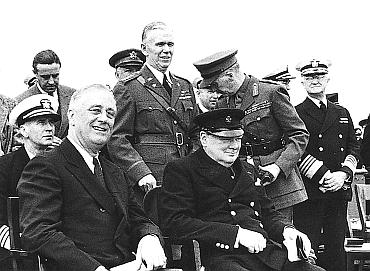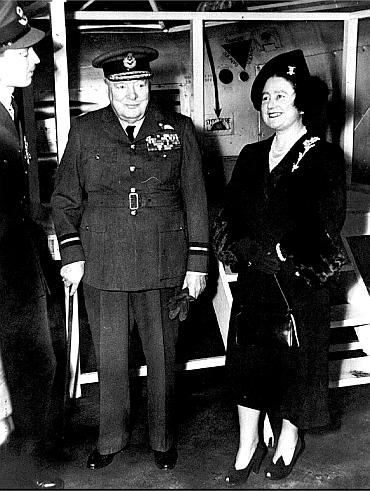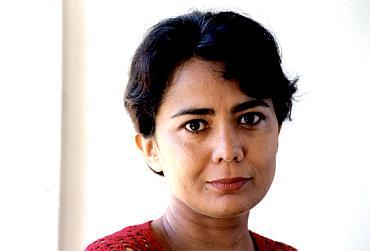
Could a man applauded for his courage in standing up to Adolf Hitler have had such contempt for another race that he did not change policies that led to starvation and death of at least three million? The man was Sir Winston Churchill and the famine that killed millions was in India in 1943.

Madhusree Mukerjee, who has served on the editorial board of Scientific America and is the author of The Land of the Naked People, took eight years to reveal Churchill's complicity in the Bengal famine in her new book Churchill's Secret War: The British Empire and the Ravaging of India during World War II.
The book, published a few weeks ago in America, has received solid reviews in India and the United Kingdom.
'Churchill's dislike of India and Indians has been known to scholars,' wrote historian Ramachandra Guha, author of India after Gandhi. 'But now, in Churchill's Secret War, we have, for the first time, definitive evidence of how a great man's prejudices contributed to one of the most deadly famines in modern history.'
'The Churchill industry, more interested in the great man's dentures than in his war crimes, has managed to keep this appalling story fairly quiet The Churchill industry has always denied that their idol could have done anything to relieve the Bengal famine. Shipping, they claim, was scarce and it just wasn't possible to send food to Bengal,' Chandak Sengoopta, who teaches history at London's Birkbeck College, wrote in The Independent "Mukerjee nails those "terminological inexactitudes" with precision Churchill, [his beloved advisor, physicist Frederick Alexander] Lindemann and their close associates simply did not consider Indian lives worth saving.'
"I have been concerned with hunger for many years," said Mukerjee, from her home near Frankfurt, Germany. "I began looking at hunger and poverty in India many years ago and came to view the role played by famine. I have no background in history; I had to look at not only history, but also the economics of colonialism. I read the works of many eminent scholars, including B N Bhatia, who has written extensively on famines in India. But many questions were left unanswered in the books and journals I studied."
She was worried that the Bengal famine was always studied as a local issue. "Nobody had really studied the complicity of outsiders [the imperial British power], and how the shipping constraints during World War II added to the situation. I had to dig deep into the history of wartime shipping and I came across information as to how Churchill changed the shipping routes around the Indian Ocean," she said.

Once Churchill entered the picture, the research took longer. "It took me more than two years to study the important role he had played in this famine," she said. "He is such a revered figure in the West, I felt it was not going to be easy to say what I was going to say. You cannot offer a half-baked account of anyone, and clearly, you cannot do so with Churchill."
The key sources she used were the Ministry of War Transport papers and the Cherwell Papers (papers and correspondence of Frederick Alexander Lindemann, 1st Viscount Cherwell).
Mukerjee's mission was to show how the primary cause of the famine was the extent to which Churchill and his advisers used Indian resources to fight Germany and Japan. "Churchill is accused of racism," she said. "It is closely tied to his vision, making the famine situation deadly for millions."
In 1947, two years after the War ended, India attained Independence, she writes, in part because the deprivation and anarchy of that fractious era had torn the fabric of its society, which was erupting in violence that the UK could no longer subdue.
On his death bed, Churchill told his doctor, 'that he had been wrong about India.' The doctor's account does not give what he regretted, Mukerjee added.
Mukerjee discussed how difficult it was to bring the book to life despite meeting the families of victims and survivors.
"I found many people who were familiar with the devastation caused by the famine," she said. "I wanted to get vivid images from them on what it feels to be hungry. But many people who have undergone hunger and deprivation or had members in their families die in the famine suffered from the psychological phenomenon of dissociation from the painful. They could tell me the bare facts but not really what it felt like."
At one point she thought of supplementing her book with fiction. "Fiction can get into the minds of people more easily," she said. "But my publisher felt I should leave out the fiction."
Years after the famine, the writer had employed a maid, who spent much of her time crying, Mukerjee writes, because during the famine she had left her daughter on a pavement to search for food. She never saw the baby again. It was routine to see 'dead people being picked up in government trucks, tossed like dogs,' Devi recalled. 'I heard they were burned in furnaces of factories.'

Among the vivid storytellers in her narrative is Ashoka Gupta.
The social worker had observed how the British paid high prices for eggs, fruit and rice to serve the Army with the promise of returning the items to the sellers when they needed the provisions, but never made an effort to return or resell the food when people were starving.
Her husband, who was in the British civil service, told her vivid stories of starvation and deprivation. And she watched many gut-churning scenes unfold around her in rural Bengal. Gupta soon mobilized her friends in the All India Women's Conference and began free kitchens from the supplies she could manage to get through government connections.
'We discovered that whenever we also let the mother stay, the child survived,' she told Mukerjee. 'I saw one mother feed her baby with such infinite patience, drop by drop, a sugar and salt solution. She saved the child.'
After a woman's child was safe, Gupta recalled, she would give her others to nurture. 'We found that those who could save their own children could save others' children, too.'
The famine generated little attention in 1943 and from 20th century historians, Mukerjee mused, 'because Bengal had long been synonymous with hunger.'
But her book is anything but bleak. It has many stories of humanity triumphing over exorbitant greed, crass exploitation and terrifying cruelty. For those reading the history of modern India for the first time, there are many provocative revelations in it.
The book, which has 340 pages, was cut to two thirds of the original, the author said.
"My publisher felt it would be difficult to sell a very big book by a relatively little-known author," she added. "There were many areas I had pursued at length. For instance, the lack of cannibalism in Bengal. In the Western world, there are instances of cannibalism when people are deprived of food But not in India. I looked at this phenomenon and addressed the issue: Where did this sophistication come from?"
And she is not done with hunger, she said, adding that she might address cannibalism and how Indians eschewed it at the most desperate time of their lives in her next book.